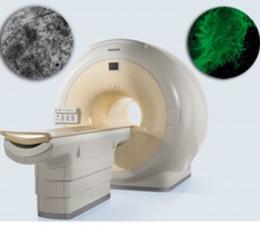Feb 18 2011
Magnetic nanoparticles could be used to track neural stem cells after a transplant in order to monitor how the cells heal spinal injuries, say UCL scientsts.
Neural stem cells are a promising treatment for repairing spinal cord injuries as they have the ability to generate tissue, but there is no effective way of monitoring the cells for long periods of time after transplantation.
 Stem cells attached to bio-compatible nanoparticles can be visualised by MRI after transplantation into spinal cord slices
Stem cells attached to bio-compatible nanoparticles can be visualised by MRI after transplantation into spinal cord slices
Nguyen TK Thanh at the Davy Faraday Research Laboratory, UCL Physics and Astronomy and the Royal Institution, and colleagues, believe they have the answer. They have developed hollow biocompatible cobalt-platinum nanoparticles and attached them to the stem cells. The nanoparticles are stable for months and have a high magnetic moment - tendency to align with a magnetic field - so that low concentrations can be detected using magnetic resonance imaging (MRI).
'Magnetic nanoparticles are emerging as novel contrast and tracking agents in medical imaging,' says Samir Pal at the California Institute of Technology, US, an expert in biological-nanoparticle interactions. 'When used as a contrast agent for MRI, the nanoparticles allow researchers and clinicians to enhance the tissue contrast of an area of interest by increasing the relaxation rate of water.'
The team labelled stem cells with their nanoparticles, injected them into spinal cord slices and took images of their progress over time. They found that low numbers of the nanoparticle-loaded stem cells could still be detected two weeks after transplantation. 'The new method demonstrates the feasibility of reliable, noninvasive MRI imaging of nanoparticle-labelled cells,' says Thanh.
Thanh hopes that her stem cell tracking method will be used during stem cell replacement therapy for many central nervous system diseases. Her team is working towards developing nanoparticles that can be used to diagnose and treat these diseases.
Source: http://www.ucl.ac.uk/